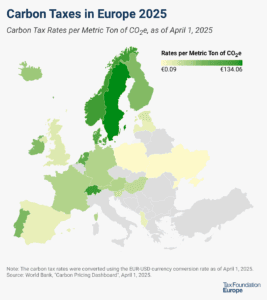
Why Italy’s Latest Windfall Profits Tax Is Still Bad Tax Policy
5 min readBy:On 7 August, the Italian government surprisingly announced a new windfall profits tax on the banking sector, causing a loss of about €9.2 billion in market value for affected firms. For context, that is more than three times the amount of revenue expected to be collected by the taxA tax is a mandatory payment or charge collected by local, state, and national governments from individuals or businesses to cover the costs of general government services, goods, and activities. .
However, shares started to slowly recover on 9 August after the government set a cap at 0.1 percent of the company’s assets. For now, it’s unclear if the cap refers to global or domestic assets. If set on global assets, most Italian banks will not reach the cap, and Italy’s two largest banks, Intesa Sanpaolo and UniCredit, will face a levy of around €0.9 billion ($1 billion) each.
The new 40 percent tax is to be applied on the larger of two amounts: the difference in the net interest margin—a measure of income defined as the difference between lending and deposit rates—between 2022 and 2021, above a 5 percent increase, or the difference in net interest margin between 2023 and 2021, above a 10 percent increase. The tax is not deductible against the corporate income taxA corporate income tax (CIT) is levied by federal and state governments on business profits. Many companies are not subject to the CIT because they are taxed as pass-through businesses, with income reportable under the individual income tax. or the regional tax. The levy will only be in place for the 2023 fiscal year, to be collected by 30 June 2024. Different sources estimate that the tax could raise between €2 billion ($2.2 billion) and €3 billion ($3.3 billion), though these figures are optimistic based on Italy’s recent experience with windfall taxes.
In March 2022, Italy was one of the first countries to impose a windfall tax on energy companies. The tax, initially introduced on the incremental added value, collected around €2.8 billion out of the €11 billion of expected revenue. The narrow tax design was heavily criticized by the targeted sectors and challenged in court. It was later replaced by a one-off windfall tax on profit margins and is expected to collect €2.6 billion in 2023.
The government claims the additional revenue from banks will be used to offset the cost-of-living crisis and support mortgages for first-time homeowners. While this may be a fine social goal, its success will rely on how much revenue is actually raised. Furthermore, the tax would likely raise mortgage and loan costs, reduce the lending volume, distort competition in the banking sector, and punitively target certain banks.
Beyond Italy’s borders, the flawed design of windfall profit taxes has already created problems in other countries that have implemented them. In Spain, associations representing Spanish banks challenged a similar tax in court alleging that this is a tax on revenue and not on income. Additionally, an EU Commission report finds that the “diverging implementation strategies across Member States have reportedly led to significant investor uncertainty.”
There are numerous economic arguments against windfall profits taxes generally, and they rarely raise the expected revenue projected by the government. While other countries in Europe—like the Czech Republic, Hungary, Lithuania, and Spain—have implemented different windfall taxes on the banking sector, this doesn’t mean Italy has to implement a poorly designed tax policy too.
Perhaps the most important argument in this case is that for the majority of banks, there is no “windfall” to tax. For the last two decades, the profit margin for Italian banks has been well below other industries’ profit margins. Incremental profits are not necessarily excess or supernormal returns (which in theory should be the target of such a tax) and a windfall tax could translate into double taxationDouble taxation is when taxes are paid twice on the same dollar of income, regardless of whether that’s corporate or individual income. of regular profits. An increase in profits after years of small profit margins due to extremely low and even negative interest rates should not be considered windfall profits.
Second, the tax reduces the amount of available capital, restricting banks’ capacity to respond to an unforeseeable financial crisis. It might also scare bank investors, thus raising the cost of capital and hindering long-term economic growth.
Third, in the event of a recessionA recession is a significant and sustained decline in the economy. Typically, a recession lasts longer than six months, but recovery from a recession can take a few years. , a rise in loan defaults would negatively impact bank profits. The European Central Bank (ECB) objected to Spain’s, Lithuania’s, and now Italy’s windfall tax on banks as it could reduce credit supply and banks’ resilience in an economic downturn.
Fourth, Italian banks might become reluctant to increase their exposure to Italian government debt (loans and bonds). Currently, government debt represents 16.4 percent of Italy’s banks’ total assets, while the Eurozone average is around 6 percent. After more than a decade during which the ECB constantly increased the purchase of Italian sovereign debt, the ECB is now diminishing its role as a buyer of government debt Europe-wide. Therefore the Italian government would need to turn to Italian banks and private investors to maintain the current level of debt to GDP.
Finally, this new windfall profits taxA windfall profits tax is a one-time surtax levied on a company or industry when economic conditions result in large and unexpected profits. Inheritance taxes and taxes levied on lottery winnings can also be considered windfall taxes on individual profits. could set a negative precedent and leave international investors guessing which industry will be the next target in the future. This could lead to less capital investment into the country over the medium term.
The windfall profits tax, which is already in force via official decree, must receive Parliamentary approval within 60 days of the announcement to become law. Amendments to the bill could also be approved. Currently, the government is studying a tax credit mechanism that banks could use during the next 5 to 10 years.
Instead of approving this bill, Italy could follow Austria’s example where banks are putting together a plan to help borrowers struggling with variable-interest mortgages. Willi Cernko, the CEO of Erste Group Bank, considers this proposal a better alternative to Italy’s “arbitrary and short-sighted measure that weakens the banking sector and reduces investment.”
Italy should focus on permanent tax reforms that have the potential to stimulate economic activity by supporting private investment and increasing its international tax competitiveness. In order to do so, Italy should stop using poorly designed tax policy to punish normal profits, consider full expensingFull expensing allows businesses to immediately deduct the full cost of certain investments in new or improved technology, equipment, or buildings. It alleviates a bias in the tax code and incentivizes companies to invest more, which, in the long run, raises worker productivity, boosts wages, and creates more jobs. for capital investment, and shift the tax mix towards less harmful consumption taxes.
Share this article




